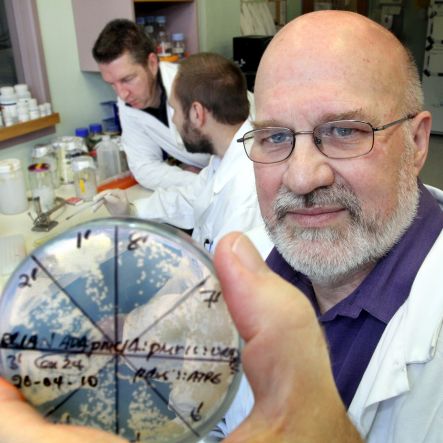
Brian Monk (front left) and two members of his research team, Joel Tyndall (left) and Mikhail Keniya (right) (image: Sharron Bennett)
Superbugs are deadly bacteria that have developed resistance to the antibiotics used to treat them. Fungal pathogens (such as the causative agent of thrush) can also become drug resistant, and the University of Otago's Brian Monk is working on new antimicrobials to fight them. Based at the Sir John Walsh Research Institute in the Faculty of Dentistry, he's focusing on the role of drug efflux pumps in the development of the triazole class of antifungals, and he's been awarded Marsden Fund support for the project.
Triazole drugs not only impact the fungal cells' ability to build the cell wall (by targeting the production of a key fungal membrane lipid), but also activate a protein that induces the synthesis of the efflux pumps. Efflux pumps export molecules across cell membranes, enabling cells to get rid of antifungals and thereby reducing the drugs' effectiveness. It also gives time for the fungal cells to develop mutations that cause high-level drug resistance. By identifying compounds that block the induced synthesis of the efflux pumps, it is hoped to modify the triazole drugs so they still inhibit the original target, block efflux pump biosynthesis, stop drug efflux, with the ultimate aim of killing off the fungal cells, not just limiting their growth.
While drug efflux pumps can cause negative outcomes such as drug resistance, they can also be used beneficially to create biofactories. For example, Brian Monk is trying to modify yeast so their efflux pumps expel useful molecules, which would otherwise be toxic to the yeast (for example, artemisinic acid, the immediate precursor to artemisinin, used to treat malaria). By scaling up production, large quantities of useful drugs could be produced in the same way that beer is made. Another possibility could be fermentating toxic feedstocks to be used for bioenergy.

